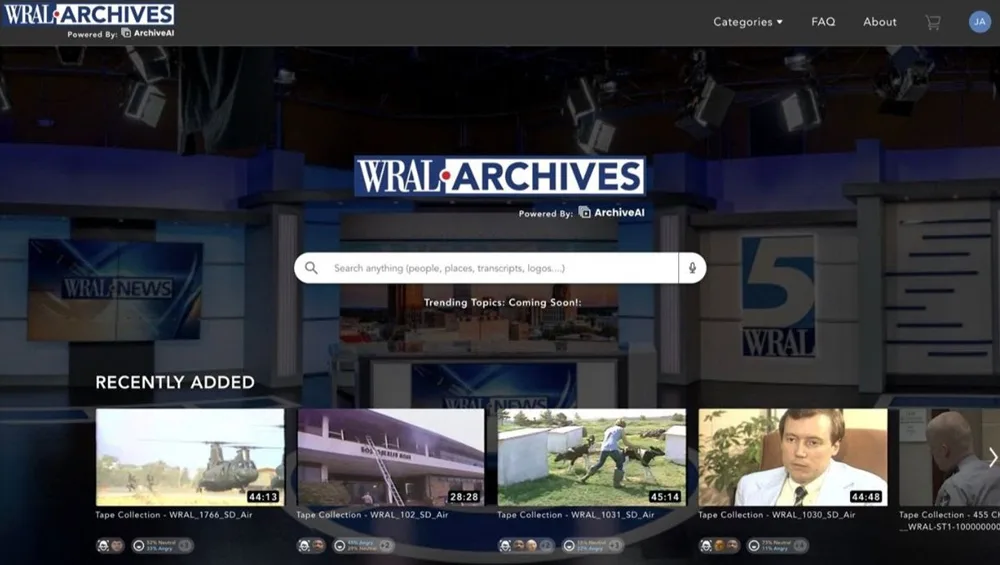
WRAL Previews Its AI-Powered WRAL Archives Platform

Capitol Broadcasting’s NBC affiliate WRAL Raleigh, N.C., announced at NAB Show New York that it will be offering a public preview of its new ArchiveAI-powered media platform, WRAL Archives, to industry users. Anyone interested in trying the new platform can create a free account at wralarchives.com.
“WRAL Archives is a revolutionary new platform that will change the way people access and use archival footage,” said Jimmy Goodmon, Capitol’s COO. “With WRAL Archives, content creators can easily find the exact clip they need from our library, regardless of how old or obscure it may be.”
WRAL Archives uses state-of-the-art artificial intelligence to automatically extract metadata from media assets, including facial sentiment, audio transcription, logo identification, subject demographics, object identification, weather conditions, and much more. The company is currently using its ArchiveAI platform to process its entire content library from WRAL’s 67 years of broadcasting.
“The detailed AI-powered search capabilities of this platform is incredible. You can search for a specific person saying a specific phrase during a year range and then filter the footage by sentiment and an AI-powered search score,” said Jon Accarrino, VP of Transformation at Capitol Broadcasting Company. “And it only takes a few seconds. I’ve never seen anything like it before.”
The team at WRAL partnered with Eon Media to leverage its AI technology to power the WRAL Archives. Eon Media was recognized with a win for best “AI/Machine Learning” at the NAB Show’s Product of the Year Awards in 2022 for its Eon Extract product.
“Working with WRAL and Capitol Broadcasting has been an immense learning and positive opportunity to challenge the status-quo and enable unique monetization opportunities,” said Ashish Agrawal, Eon Media founder-CEO. “WRAL Archives is a testament to the power of AI to transform the way we interact with and consume video content.
Internally, the WRAL team has already made some important discoveries in their archives because of the new AI-generated metadata.
“We keep finding clips from the 1960s, 1970s and 1980s that we thought were lost,” added Pete Sockett, WRAL director of engineering and operations. “Videotape was expensive back then and people would often try to put as many clips as they could on one tape. So, a tape with an air check from the 1980s might have some bonus clips at the end that we didn’t know that we still had.”
WRAL began broadcasting in 1956 and has an extensive collection of more than 500,000 hours of archive footage. In addition to its older archive media, the company produces over 11 hours of new content per day. To approach this challenge, the team is ‘burning the candle at both ends’ and having AI process both the newest and oldest footage in their archive at the same time.
The project team started testing with a collection of digitized tapes. Consisting of a mix of news packages and air-checks from the 1970s and 1980s, these longer clips with lower resolutions were a good test of the AI’s capabilities. Lower resolutions can be challenging for both humans and AI to identify things like faces, objects, and logos. Another major test for the AI was segmentation. Because the longer air-check tapes can contain multiple newscasts, the AI needs to use contextual clues to automatically split clips into smaller segments.
While the AI was processing WRAL’s older archives, the project team then began building automations for their newest content. After each WRAL newscast, assets now automatically move into a server that sends them to the ArchiveAI for metadata processing and inclusion on wralarchives.com.
“WRAL Archives is a game-changer for the TV news industry,” said John Conway, Capitol’s director of special projects. “It gives broadcasters and other media organizations a way to make their archival content more accessible and valuable than ever before.”
Teams at both WRAL and Eon Media have been working on the WRAL Archives project for over a year. In addition to the 11 hours of new daily content being produced by WRAL, an additional 1,000-plus files are processed by artificial intelligence every day. WRAL says it’s months away from having AI process 100% of its archive, but the platform is at a point where it’s ready for a test drive.
“We are still finalizing everything. A lot of footage still needs to be processed. But we are at the stage where we want user feedback from the NAB community,” Accarrino added. “This AI-powered platform is a tool that other media organizations will be able to take advantage of, and gathering valuable feedback from our industry peers will help make it even better.”
































Comments (0)